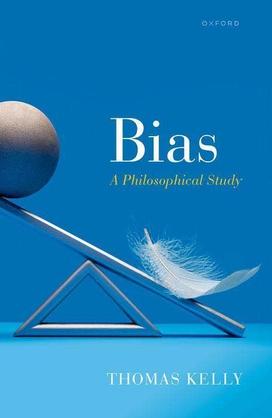Professor Thomas Kelly Questions Bias in New Book
The book: Bias is a word society often throws around — to describe the media, politics, and more — but what does it really mean? That question is at the heart of Thomas Kelly’s new book, Bias: A Philosophical Study (Oxford University Press). Kelly, a professor of philosophy, explores the nature of bias and sociality practices of attributing to it. He argues that morality and rationality can require bias. Kelly’s goal with writing Bias is to expand our general understanding of the term and propose new theoretical questions and answers around the subject to challenge our thinking.

The authors: Thomas Kelly is a professor of philosophy at Princeton. He earned his Ph.D. from Harvard and focused on the relationship between practical rationality for his dissertation. He specializes in epistemology, the theory of rationality, and philosophical methodology. His work has been published in various academic journals including The Journal of Philosophy and Philosophical Studies, among others.
Excerpt:
A Familiar Phenomenon
Which types of human beings best exemplify true courage?
When asked this question, some people might immediately think of soldiers on a battlefield or of firefighters rushing into a burning building. Others might think first of political dissidents or civil rights activists, individuals who knowingly risk grave harm in order to speak Truth to Power.
When the philosopher Plato posed this question over two thousand years ago, he offered us a surprising answer. True courage, Plato suggested, is most likely to be found among the philosophers. Even allowing for the significant differences between the philosophers of Plato’s time and the professors of philosophy of the 21st century, Plato’s answer to his own question does not exactly leap off the page at the reader as the most plausible thing he might have come up with—to put it mildly. Moreover, coming as it does from Plato, the answer strikes us not only as implausible but also as suspicious. It’s very much the type of answer that we might expect a philosopher—but no one else! —to give. Although he offers us a characteristically complicated argument for his view, we naturally suspect Plato of bias when he tells us that it’s really the philosophers who are the most courageous of all.
Of course, if in fact Plato was biased about certain questions, he’s in good company. Presumably, people have exhibited biases—in their behavior, as well as in their beliefs about what’s true—for as long as there have been people. Concerns about bias—usually, concerns about the biases of other people, and more occasionally, concerns about one’s own—also have a long history. In philosophy, an interest in the topic of bias predates any of the figures or texts that are treated as canonical by the Western philosophical tradition: in the East, Confucius took the absence of bias to be one of the characteristic features that distinguishes the virtuous person from others.
The word “bias” entered the English language in the 1500s. Its origins are instructive. One of its earliest uses—and the one from which all current uses of the word that are relevant to this book derive—was as a technical term in competitive sports. In the English sport of lawn bowling, or bowls, the object of the game is to roll your ball (or “bowl”) as closely as possible to another, smaller ball that has already been rolled somewhere on the field of play. (As that description suggests, the sport is a close cousin to the now somewhat better-known sport of bocce ball. The English rulers of the day generally disapproved of lawn bowling, on the grounds that its surging popularity might divert interest from archery, which they viewed as better preparation for warfare.) Although the basic object of the sport is simple, much of its interest and challenge comes from an important twist.
Each ball was constructed so as to have a certain “bias,” which distorts the direction in which it would otherwise travel when it is rolled. Originally, the bias was produced by making sure that one side of each ball was weighted more heavily than the other side. (Usually, lead was used to achieve this purpose.) This lack of balance ensured that the ball would travel, not in a straight line, but in a curved path in the direction of its bias. The general idea of a bias as that which distorts something in a certain direction, away from the natural path or direction that it would otherwise take, perhaps through a mechanism involving unbalanced weighting, survives to this day in many of the most prominent contemporary uses of the term “bias.”
As the example of Plato suggests, intelligence is no guarantee against bias. The ease with which even the most impressive among us succumb to bias, and the perceived importance of avoiding it, sometimes makes its apparent absence especially celebrated. When, fifteen years after George Washington’s death, Thomas Jefferson sat down to explain what in his eyes made Washington a great leader, he gave pride of place not to Washington’s genius for military tactics, nor to his reputed personal honesty, but rather to his capacity for unbiased decisionmaking:
His integrity was most pure, his justice the most inflexible I have ever known, no motives of interest or consanguinity, of friendship or hatred, being able to bias his decision.
Of course, Washington was not without his biases. Some of these were invisible to Jefferson, since he shared them, and they were common among those whom he regarded as his peers. Like Jefferson and Washington, we too no doubt have biases that are largely invisible to us, perhaps because they are shared by those around us whom we respect and admire, including some biases that will seem obvious to later generations. Like Jefferson, we too are much concerned with bias and its absence, both among our contemporaries and among those now dead.
Indeed, although bias has undoubtedly always been with us, our explicit concern with bias, and our tendency to see or conceptualize our most pressing social problems in terms of it, has perhaps never been greater than it is now. Notably, this tendency is shared by people who might otherwise seem to have little in common, such as those who occupy opposite ends of the political spectrum. For example, on the one hand, a prominent theme among social critics on the left is that radical changes to existing institutions are called for in response to pernicious and systemic racial biases, as manifested in the criminal justice system, or in the glaring disparities in wealth among different racial groups. On the other hand, conservative critics who deny that such changes are in order will frequently make much of what they regard as entrenched political biases in the media and in higher education. Moreover, on both sides, there is an emphasis on the various forms that biases can take. Even if bias was once thought of primarily as a characteristic of individual people, when the would-be reformer condemns the criminal justice system as racially biased, or the conservative claims that the mainstream media has a left-wing political bias, each is concerned with bias primarily as a characteristic not of individuals but rather of institutions, at least in the first instance. That bias is the problem—or at least, a big part of our problems—is a common theme, even among people who agree about little else.
The Philosophy of Bias: Expanding the Playing Field
This book is a philosophical exploration of bias, in the sense of “bias” that we naturally suspect Plato of when he tells us that, contrary to what we might have thought, it’s actually the philosophers who are the most courageous of all. (Although as will become clear, the book is not exclusively concerned with biases exhibited by people.) I originally conceived of the project as a relatively wide ranging exploration of a number of theoretically interesting issues about bias, issues that were largely independent of one another, as opposed to the development and defense of some more general, overarching theory of bias. For the most part, the book reflects that original vision. In particular, much of it consists of a series of independent proposals about different questions, and the individual chapters are largely self-contained and can be read more or less independently of one another, in accordance with the reader’s interests.
Excerpted from Bias: A Philosophical Study by Thomas Kelly. Copyright 2023. Published with permission of the author.
Reviews:
“The philosopher Thomas Kelly has been working in the field of epistemology for many years, and his new book on bias is an impressively careful and cool-headed attempt to introduce some order into the conceptual mess.” — Jessie Munton, associate professor in philosophy at the University of Cambridge












No responses yet